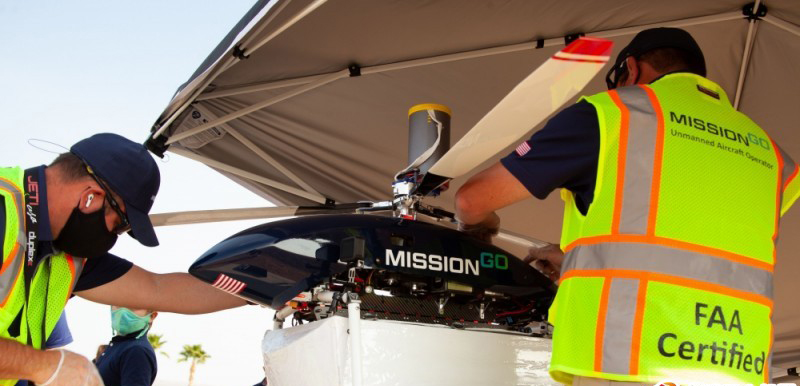U.S. uses drones to deliver human organs

MissionGO, an unmanned aerial vehicle solution provider, and the Nevada Donation Network (OPO), an organ procurement organization, announced that on September 17th, two successful test flights of drone used for deliver human organs in USA
The first flight transported the study cornea from Nanshan Hospital and Medical Center to Dignity Health-
San Rose Dominica, San Martin Campus. This flight successfully demonstrated the feasibility, value, efficiency gains and delivery speed of life-saving medical supplies and organs through the "unmanned aerial system" in an urban environment.
The second flight transported a kidney for research from the airport to a location outside a small town in the Las Vegas desert. This is the longest organ transport flight in the history of the "unmanned aerial system". This flight distance surpassed a historic flight in April 2019 when MissionGO team members Anthony Pucciarella and Ryan Henderson published the first in their roles on the University of Maryland drone testing website and in collaboration with the University of Maryland Medical Center. A kidney drone was successfully transplanted to the patient.
"These flights are an exciting advancement - the test flight of the study last week is another data point to illustrate that drones are a reliable life-saving cargo, transportation method, and MissionGO drones are safe and effective. Loads and people on the ground-even at greater distances," Anthony Pucciarella said to MissionGO president. "We are very pleased to be able to test our technology with our partners in the Nevada Donation Network, and look forward to more such research, what we can achieve together."
Considering that most of the organ donated in Las Vegas must be shipped to other states because of the limited transplantation projects in the local area, MissionGO's second flight test emphasized the exciting future of organ transportation in the Las Vegas area. possibility. The use of unmanned aircraft in the multimodal transport chain will shorten the time between organ donation and transplantation, and the use of electric aircraft will reduce the carbon footprint, and may increase the efficiency of organ harvesting and save more lives.
The Nevada Aviation Research is the beginning of a series of medical and aviation research flights with OPOs in other regions. Joe Ferreira, CEO and President of the Nevada Donation Network, said: "The success of the trial last week pushed us into the future of organ transportation and will enable us to achieve greater success in the coming years." "We are doing it now. The work of maximizing the gift of life and health can only be further enhanced through the services displayed by MissionGO. The future of organ donation and transplantation will be defined by innovation."
In addition to demonstrating the capabilities of the unmanned aerial system, these tests emphasize the feasibility of a contactless solution, using air transport instead of ground messengers to directly transport human organs between hospitals, reducing the number of transfers.
MissionGO focuses on drone operations, while its sister company MediGO focuses on improving the logistics of organ transplants in all modes of transportation.
Dr. Joseph Scalia, the chief medical officer of MediGO, will analyze the kidney and cornea to study the structure of the transplanted tissue and the cell survival rate before and after these flights. The analysis aims to clarify the possible impact of drones on human tissues and confirm that organ transportation via drones can be carried out safely. MissionGO plans to conduct additional flight tests with other OPO innovation partners across the country later this year and throughout 2021.
Electric VTOL 320 for deliver cargo

Electric VTOL 320 specification
|
MTOW
|
20.3kg
|
|
Weight w/o battery and payload
|
9.69kg
|
|
Wingspan
|
3200 mm
|
|
Length
|
1,200 mm
|
|
Height
|
500 mm
|
|
Frame weight
|
3.2kg
|
|
Max payload(battery included)
|
10.61kg
|
|
Battery weight
|
7.53kg
|
|
Endurance(20.3kg take-off weight)
|
2.5 hours
|
|
Cruise speed
|
78-90km/h
|
|
Max speed
|
100km/h
|
|
Stall speed
|
57.6km/h
|







